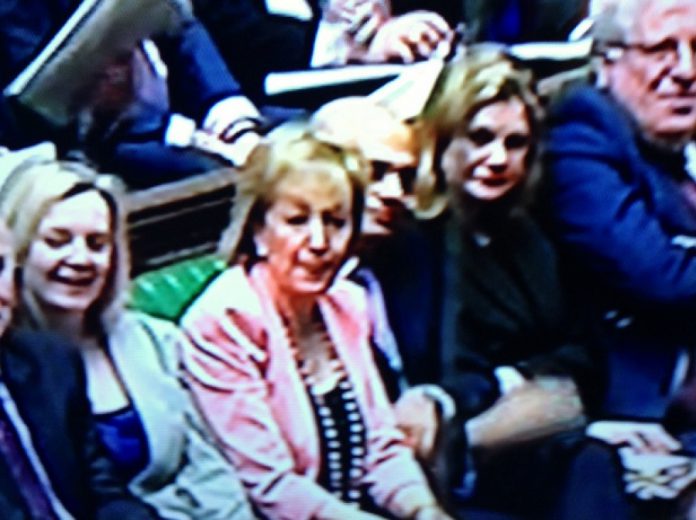By Rumyana Vakarelska
UK voters, some of them long-standing foreign-born British citizens, have to read carefully between the lines before they cast their votes in UK’s general elections on May 8, as Budget 2015 served as a warning rather than a reassurance.
The Institute of Fiscal Studies, an independent leading UK think-tank, named it a ‘budget for votes’. At a Whitehall conference before the foreign press, Andrea Leadsom, the Economic Secretary to the Treasury, Conservative MP, (pictured), shed light on how David Cameron’s coalition government wanted the wider world to see the budget, but this effort raised a number of questions.
‘We consolidated debt through benefits cuts, tax evasion and public departments’ savings’, said Leadsom. ‘In 2010 one in 4 pounds was borrowed’, according to her. ‘In the last four years, UK has created more youth jobs than anywhere in the EU, namely 2, 3 million apprenticeships on good jobs at lower salaries to start with, but then they gradually increase and become proper jobs’, Leadsom said.
Budget 2015 envisages significant public spending cuts over the next three years from cutting all work age benefits from 2016 to continuing outsourcing NHS services, meaning that getting simple health checks under NHS such as an ultra sound, will remain difficult. New expenditure on some critical sectors such as health care, education, job creation and affordable homes construction are currently set to take place only in the last year of the next government’s term.
However, even if the Tories do not win the next general elections, they will still hold a substantial number of votes in the Commons and may sustain some of the Budget 2015 public spending cuts.
On a more positive note, GDP grew 2,6 pc in 2014, reaching 2007 levels, while the national debt is forecast to start dropping as a GDP share by 2015-2016, but is not clear if this forecast will improve or not, as budget 2015 aims to impress voters either at the bottom of UK annual earnings, or the super-rich. Budget 2015 plans the nontaxable trash hold to up to GBP 10, 600 from April 2015 and GBP 11, 000 from 2016, which will effect 17 million people in the UK, according to Leadsom.
Meanwhile, those getting annual interest of up to GBP 1000 on their savings will not pay tax on it offering free savings for a few as at the current Bank of England (BoE) interest rates at 0,5 such annual savings can only be earned on 6 figures savings, leaving big parts of the middle and working classes worse off.
In addition, those earning parents, who have got two children, paying the biggest bulk of tax in the public coffers will continue paying tax on two incomes, but getting squeezed health care, childcare and education opportunities, not to mention the level of the university tuition fees, which reached unprecedented high levels of minimum GBP 9000 annually under the Conservative-Liberal Democrat Coalition government.
At the moment, only Scotland offers free education for its citizens after a minimum of three years of permanent residence, while the Welsh National Party is lobbying the current annual GBP 3000 fees for Welsh residents at the universities of Wales to be waved altogether. Unlike Scotland, Wales, has got an earlier independence on its some of its public expenditure and is at large gearing up towards a socialist model.
Nicola Sturgeon, SNP’s leader of all party leaders was the only UK Party leader, who recently put an emphasis on improving productivity in Scotland, but the Scottish Labour leader Jim Murphy insisted that voting SNP instead of labour will only help the Tories stay into power.
The Conservatives, did not yet experience a significant pressure for structural changes in the UK’ economic model, as UK currently represented the fastest growing economy in G7 in 2014, while living standards were visibly falling, but the big questions of how this new model is going to stand beyond party politics remains open.
To bring the badly needed for ex-pat votes country comparative opinion, a Japanese analyst has said Labour is still better for the UK right now, as Japan has suffered a deep financial crisis ten years ago, whereby cuts did not help recovering the economy.
For businesses, Leadsom said that the current government has lowered the incorporation tax to 20 pc from 28 pc in 2010 when the current government came in power, which she believes will encourage UK and foreign business, while reducing tax avoidance that has recently riddled the reputation UK’s biggest commercial bank, HSBC.
Leadsom said that punitive measures will imply to anyone, who diverts tax on profits, or averts from paying the so called ‘Google tax’, while the UK’s low incorporation tax will encourage large businesses to drop ways to tax evasion.
While is not clear if UK’s stronger tax avoidance measures are well coordinated with the OECD programme on the same issue, Leadsom said that UK has led on tax avoidance law and enforcement and this should not be a problem.
The creation of a Northern Power House, whereby investment in fibre optics networks and infrastructure are envisaged, so Internet speed reaches 100 MB per second, while the overall investment aims at boosting manufacturing and regional economy based on new regional economic development policies. However, in these claims there was no a clear model of how the UK economy will get better integrated, as speed of Internet even in London varies across different boroughs, while providers’ speed offers vary.
Meanwhile, cutting insignificantly the duty on beer and on petrol when the oil prices are low, will have a little impact on business and the tax payer, but Leadsom insisted that this aims at spreading the benefits of growing economy.
In addition, Budget 2015 envisages the sale of shares in UK tax-payers-owned Lloyds Bank and Northern Rock after both were hit by the global financial crisis and the lack of sufficient fiscal discipline in both organisations leading to their rescue by the government.
‘Holding an EU referendum will not shake UK’s economic prospects as this is about creating an event that will bring eventually certainty in business and politics, so having a clear time table is better,’ she said confirming that under the Tories the UK will hold in 2016 an EU referendum.
‘We agreed to be a member of a Prosperity Fund and keep closer EC relations, while we support TTIP’, she said.
‘However, only 1pc of the UK population has got pension savings or on average this is GBP 78 GBP per week on average, although UK got 1, 9 million private sector workers, who could afford saving better.
‘Under the Tories, the governmental expenditure is expected to fall to 36 pc of GDP by the end of next Parliament, which is comparable with Gordon Brown’s last budget, not lower, while the UK debt of GBP 30 billion remains at 2010 levels,’ Leadsom said.
Copyright2015@RumyanaVakarelska






















